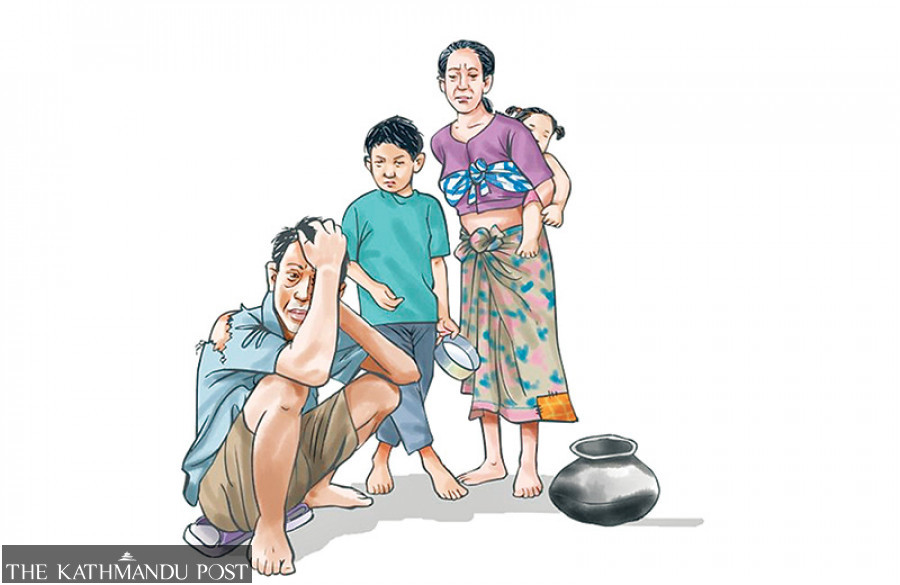National
Government indecision delays scrapping of anti-poverty body
Staffers of Poverty Alleviation Fund remain unpaid for four months.
Prithvi Man Shrestha
Employees at the Poverty Alleviation Fund have not received their salaries since mid-July as the government’s plan to scrap the fund drags on.
It has been exactly three years since the government first decided to scrap the Poverty Alleviation Fund (PAF) but the institution continues to exist. Also in the current fiscal year’s budget, the government has promised to shut down the institution.
“As the institution is supposed to be shut down, we currently don’t have the board of directors,” said Nirmal Kumar Bhattarai, vice-chairperson of the PAF.
“And since the employee number at the fund has to be endorsed by the board every year, its existing employees have not received their salaries since the start of the current fiscal year as the board has not met.
The PAF is currently manned by 13 staffers including seven working on a contract basis. A majority of the original staff of the PAF were laid off three years ago after the government decided to scrap the institution.
The contract staff were given a three-month term extension at the start of the current fiscal year by the Prime Minister’s Office and they are supposed to get yet another extension of three months, according to Bhattarai.
What has disappointed Bhattarai the most is that his staff failed to receive their salaries even during Dashain and Tihar festivals.
“Even the permanent staffers remain unpaid,” he said, adding, “Before scrapping the PAF, the government should pay the salaries and provident funds of the employees.”
“As the board has not met for long, we sent a proposal to the Prime Minister’s Office asking the Prime Minister to make decisions at the fund on the recommendation of its vice-chair, but there has not been any progress on the proposal.”
The Poverty Alleviation Fund Act-2006 has envisaged a nine-member board at the fund, but currently it just has four members including the Prime Minister, who is its chair, as the government has not appointed the other members.
“Recently, a meeting of top bureaucrats headed by Chief Secretary Shankar Das Bairagi has decided to scrap the fund by mid-January 2022,” said Bhattarai. “But, there is doubt whether the government will be able to meet the deadline as there are a number of tasks that need to be completed before shutting down the fund.”
Besides settling staff liabilities, the government also needs to decide about the Rs19 billion in revolving funds managed by community organizations formed by the PAF in various districts and how to hand over the existing PAF assets to the government, according to the PAF. The scrapping process is likely to see further delay as it also requires parliamentary endorsement, but the parliament is not in session.
Of its Rs19 billion fund, Rs15 billion came from the government, most of which in the form of grants from the World Bank while the remaining Rs4 billion was generated by local communities across the country.
It has been a year since the PAF submitted a proposal for transforming the revolving funds into cooperatives but the government has yet to decide on the matter. However, the community groups have voluntarily formed 408 cooperatives across the country as of last fiscal year, according to the PAF.
In an effort to reduce poverty, the fund had set up 32,276 community groups that operated revolving funds across the country. The revolving funds provided credit to people in the communities for income generation activities.
The PAF was established in 2003 at the height of the Maoist insurgency when government agencies and elected representatives could not work with local communities.
But in the changed political context under a federal system, as local governments are active and have the primary responsibility of working for the welfare of the people, the government decided to scrap the PAF. Also, the World Bank, which was supporting the PAF, decided to discontinue its support.
Giving continuity to the Poverty Alleviation Fund would also contradict the Guidelines on Operation of Community Organizations and Small Infrastructure Development Programmes promoted by the fund.
The Guidelines on Operation of Community Organizations and Small Infrastructure Development Programmes approved by the fund’s board on April 7, 2019, make local governments responsible for: keeping records of community organisations and small infrastructure projects promoted by the fund; facilitating community organisations to continue anti-poverty initiatives; monitoring the operation of revolving funds established at the community level; involving community organisations in policy making of local governments and monitoring their transactions; and launching skill development programmes.
But, Bhattarai said the local governments have not yet taken responsibility for the revolving funds and this has increased the risk of embezzlement of the fund’s Rs19 billion.
According to the PAF, its administrative expenditure in the last fiscal year stood at Rs16.36 million.




 13.12°C Kathmandu
13.12°C Kathmandu














